| Human Experience: Philosophy, Neurosis and the Elements of Everyday Life | |
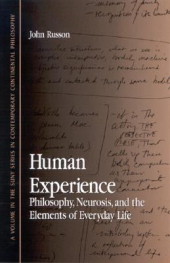 |
“…Human Experience is a genuine and original work of philosophy … It is exemplary in its clarity and rigor of expression.” — Continental Philosophy Review
John Russon’s Human Experience draws on central concepts of contemporary European philosophy to develop a novel analysis of the human psyche. Beginning with a study of the nature of perception, embodiment, and memory, Russon investigates the formation of personality through family and social experience. He focuses on the importance of the feedback we receive from others regarding our fundamental worth as persons, and on the way this interpersonal process embeds meaning into our most basic bodily practices: eating, sleeping, sex, and so on. Russon concludes with an original interpretation of neurosis as the habits of bodily practice developed in family interactions that have become the foundation for developed interpersonal life, and proposes a theory of psychological therapy as the development of philosophical insight that responds to these neurotic compulsions. |
| Bearing Witness to Epiphany: Persons, Things, and the Nature of Erotic Life | |
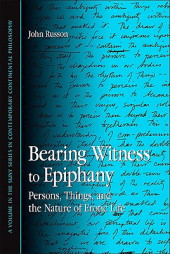 |
“Bearing Witness to Epiphany is another beautifully written book by John Russon, a companion to his excellent Human Experience. While continental philosophy has relentlessly deconstructed the classical form of the philosophy book, Russon has revived this form in a most compelling way. Russon’s writing is so lucid, that the book seems to read itself. More importantly, like Human Experience, Bearing Witness to Epiphany is the expression of profound thinking. This book should make it clear to everyone that John Russon is one of the few original voices working in continental philosophy today.” — Leonard Lawlor, coeditor of The Merleau-Ponty Reader
In this probing sequel to the popular and award-winning Human Experience, John Russon asks, “What is it to be a person?” The answer: the key to our humanity lies in our sexuality, where we experience the freedom to shape identities creatively in cooperation with another. With grace and philosophical rigor, Russon shows that an exploration of sexuality not only illuminates the psychological dimensions of our interpersonal lives but also provides the basis for a new approach to ethics and politics. Responsibilities toward others, he contends, develop alongside our personal growth. Bearing Witness to Epiphany brings to light the essential relationship between ethical and political bonds and the development of our powers of expression, leading to a substantial study of the nature and role of art in human life. |
| Reading Hegel’s Phenomenology | |
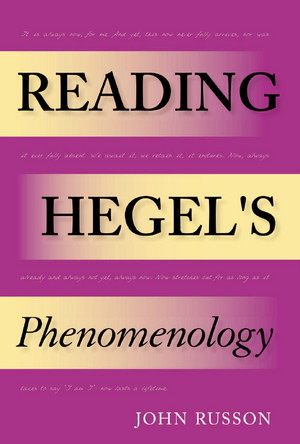 |
“The 15 chapters each focus on a section of Hegel’s book, making this an excellent resource in a course on Hegel’s Phenomenology of Spirit. Summing Up: Highly recommended. Upper-level undergraduates through faculty/researchers.” —Choice
In Reading Hegel’s Phenomenology, John Russon uses the theme of reading to clarify the methods, premises, evidence, reasoning, and conclusions developed in Hegel’s seminal text. Russon’s approach facilitates comparing major sections and movements of the text, and demonstrates that each section of Phenomenology of Spirit stands independently in its focus on the themes of human experience. Along the way, Russon considers the rich relevance of Hegel’s philosophy to understanding other key Western philosophers, such as Aristotle, Descartes, Kant, Husserl, Heidegger, and Derrida. Major themes include language, embodiment, desire, conscience, forgiveness, skepticism, law, ritual, multiculturalism, existentialism, deconstruction, and absolute knowing. An important companion to contemporary Hegel studies, this book will be of interest to all students of Hegel’s philosophy. |
| The Self and Its Body in Hegel’s Phenomenology of Spirit | |
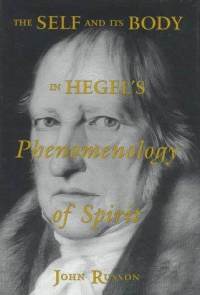 |
“This treatise makes an outstandingly important contribution to the interpretation of the Phenomenology.” –H.S. Harris, The Owl of Minerva
A major criticism of Hegel’s philosophy is that it fails to comprehend the experience of the body. In this book, John Russon shows that there is in fact a philosophy of embodiment implicit in Hegel’s Phenomenology of Spirit. Russon argues that Hegel has not only taken account of the body, but has done so in a way that integrates both modern work on embodiment and the approach to the body found in ancient Greek philosophy. Although Russon approaches Hegel’s Phenomenology from a contemporary standpoint, he places both this standpoint and Hegel’s work within a classical tradition. Using the Aristotelian terms of ‘nature’ and ‘habit,’ Russon refers to the classical distinction between biological nature and a cultural ‘second nature.’ It is this second nature that constitutes, in Russon’s reading of Hegel, the true embodiment of human intersubjectivity. The development of spirit, as mapped out by Hegel, is interpreted here as a process by which the self establishes for itself an embodiment in a set of social and political institutions in which it can recognize and satisfy its rational needs. Russon concludes by arguing that self-expression and self-interpretation are the ultimate needs of the human spirit, and that it is the degree to which these needs are satisfied that is the ultimate measure of the adequacy of the institutions that embody human life. This link with classicism – in itself a serious contribution to the history of philosophy -provides an excellent point of access into the Hegelian system. Russon’s work, which will prove interesting reading for any Hegel scholar, provides a solid and reliable introduction to the study of Hegel. |
| Reexamining Socrates in the Apology | |
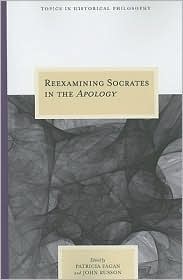 |
Co-edited with Patricia Fagan
“This fine collection . . . has a tenacious loyalty to details, reading them with utmost care and sensitivity to the dialogue as a whole, other dialogues, Athenian history, as well as its literary scene (especially Aristophanes and his play The Clouds), and the subtleties of the Greek language. The result is as astonishing as it is illuminating: the Apology is given back to us in its complexity and its profundity.” –Jason Wirth, Penn State University. “No one is wiser than Socrates.” After hearing these words, the Greek philosopher Socrates made it his life’s work to interpret them. Each of the original essays in this book brings into focus the Socrates of Plato’s Apology, attendind carefully to the work’s dramatic details, its philosophical teaching, and its complexity as a piece of writing. Overall, the contributors to Reexamining Socrates, distinguished scholars of ancient philosophy, share a conviction that the Platonic text cannot be reached except through a process of reading and thinking that mirrors Socrates’ own hermeneutical practice–the Socratic “examination.” True to the Socratic injunction that the unexamined life is not worth living, editors Patricia Fagan and John Russon continue that practice of examination, uniting the demands of mind and those of the text to offer a reexamination of Socrates in the Apology. |
| Retracing the Platonic Text | |
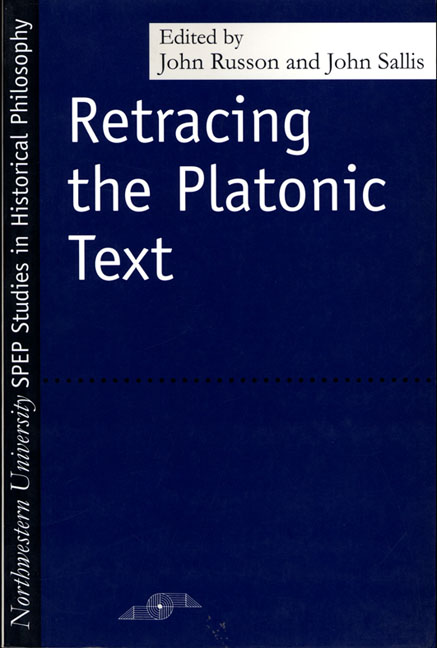 |
Co-edited with John Sallis, (Evanston: Northwestern University Press, 2000) |
| Hegel and the Tradition: Essays in Honour of H.S. Harris | |
 |
Co-edited with Michael Baur, (Toronto: University of Toronto Press, 1997)A Festschrift for H.S. Harris. |


 Participants in these
seminars consistently have the experience of growth in their conversation and
conceptual abilities, and typically leave with a transformed sense of the nature
and possibilities of philosophy.
Participants in these
seminars consistently have the experience of growth in their conversation and
conceptual abilities, and typically leave with a transformed sense of the nature
and possibilities of philosophy.




